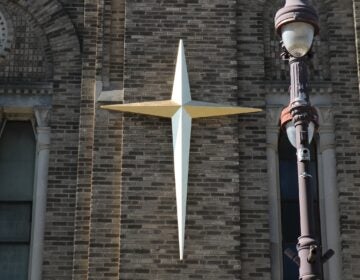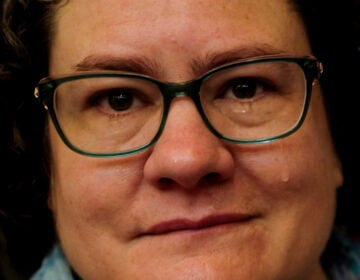Rocked by gay clergy issues, closures and mergers, the United Methodist Church is ‘in turmoil’
Across the country, some of the largest UMC communities teeter on dissolution amid a raging debate over the church’s ban of LGBT clergy.
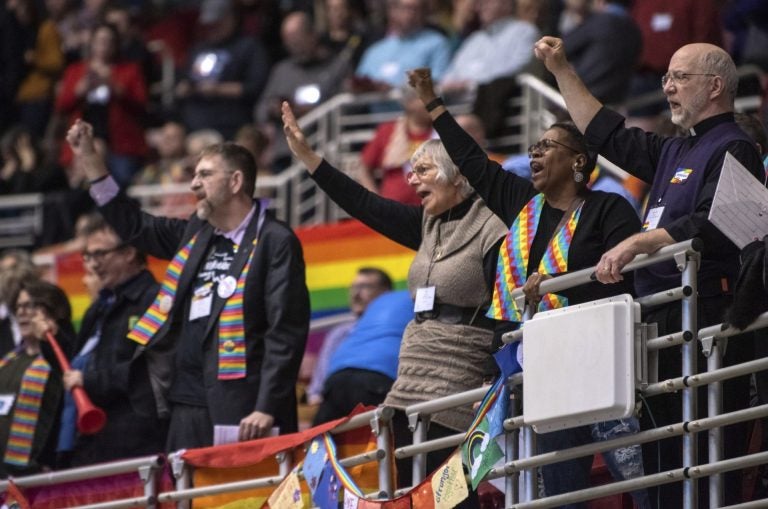
Protestors chant during the United Methodist Church's special session of the general conference in St. Louis, Tuesday, Feb. 26, 2019. America's second-largest Protestant denomination faces a likely fracture as delegates at the crucial meeting move to strengthen bans on same-sex marriage and ordination of LGBT clergy. (Sid Hastings/AP Photo)
This article appeared on PA Post.
—
The turmoil roiling the United Methodist Church in central Pennsylvania pales in comparison to the deep fissures that threaten to destroy the world’s second largest Protestant denomination.
Across the country, some of the largest UMC communities teeter on dissolution amid a raging debate over the church’s ban of LGBT clergy.
That includes the denomination’s largest church — the Kansas City area-based 22,000-member Church of the Resurrection – whose pastor, Adam Hamilton is protesting the denomination’s ban on LGBT clergy by withholding more than $1 million in contributions to church leadership.
The divisive issue has sent shockwaves across the church.
Scores of congregations have raised rainbow flags, watched young and old stage protests and even defied church code by officiating over gay marriages. On Tuesday, Baldwin Wallace University severed its affiliation with the denomination. The private Methodist liberal arts university in Berea, Ohio was established 174 years ago.
In Harrisburg, decidedly on a far smaller scale, the agitation within the denomination has been generated by a plan to close 10 city churches and merge them into one new congregation.
Two churches have willingly merged, but the remainder have voted to resist the restructuring. Amid the fury of debate one pastor has been removed, and another congregation has voted to leave the denomination and join another. A number of congregants have reached out to PennLive to express sheer anger or disillusion with church leadership.
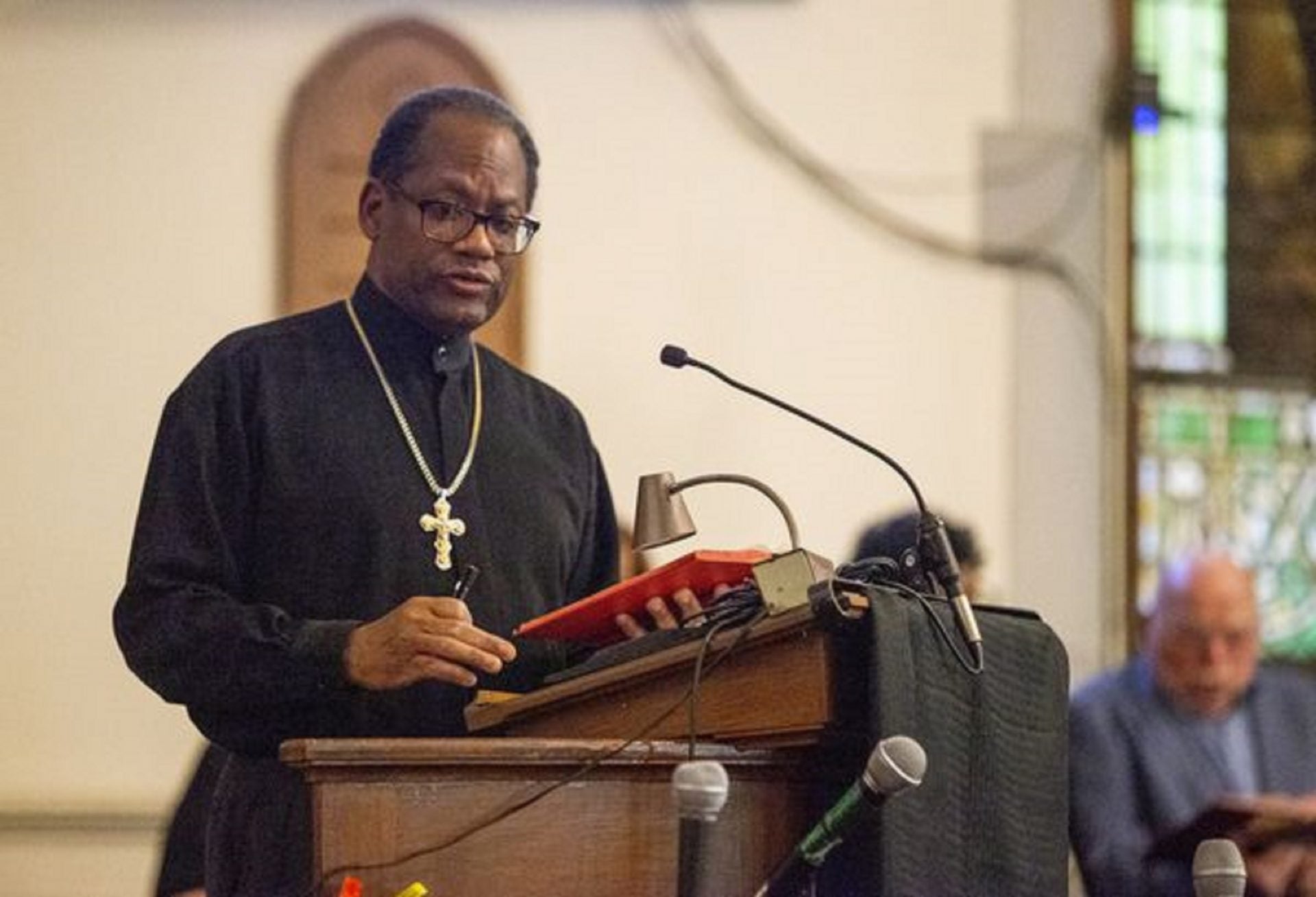
The scale may differ but not so much the ramifications: In central Pennsylvania as across the country the United Methodist Church is under distress amid a groundswell of disgruntled and confused congregants and clergy at odds with church leadership.
“What is happening in Harrisburg specifically with regards to the previous announcement by the Susquehanna Annual Conference to close churches, which seemed to be issued publicly and in an arbitrary fashion without taking into consideration the leadership of these churches is part of the larger maelstrom engulfing the whole denomination,” said William Lawrence, professor emeritus at Southern Methodist University in Dallas. “The whole denomination right now is in turmoil.”
In fact, United Methodists, who trace their origins to John Wesley, an 18th century Anglican minister in England, are no strangers to divisive issues. Across the years, challenges that have imperiled the church have ranged from schisms over church governance and the role of laity, to a formidable division that reshaped the church in the U.S.
During the mid-19th century, the American Methodist church was so split over the issue of slavery that it splintered into two groups. Almost 100 years would pass before the two sides, in 1968, reconciled under one church.
“We’ve had divisions throughout history over a variety of issues,” Lawrence said. “What seems to be looming is the possibility of a division over matters of social policy, human justice, and theology that centers around human sexuality.”
The current debate across Harrisburg over the fate of 10 churches is the second time in recent years that the region has served as the backdrop for turmoil within the United Methodist Church.
In 2013, the attention of the U.S. Methodist community was fixed on a Lebanon County pastor who was put on church trial on charges he violated church policy.
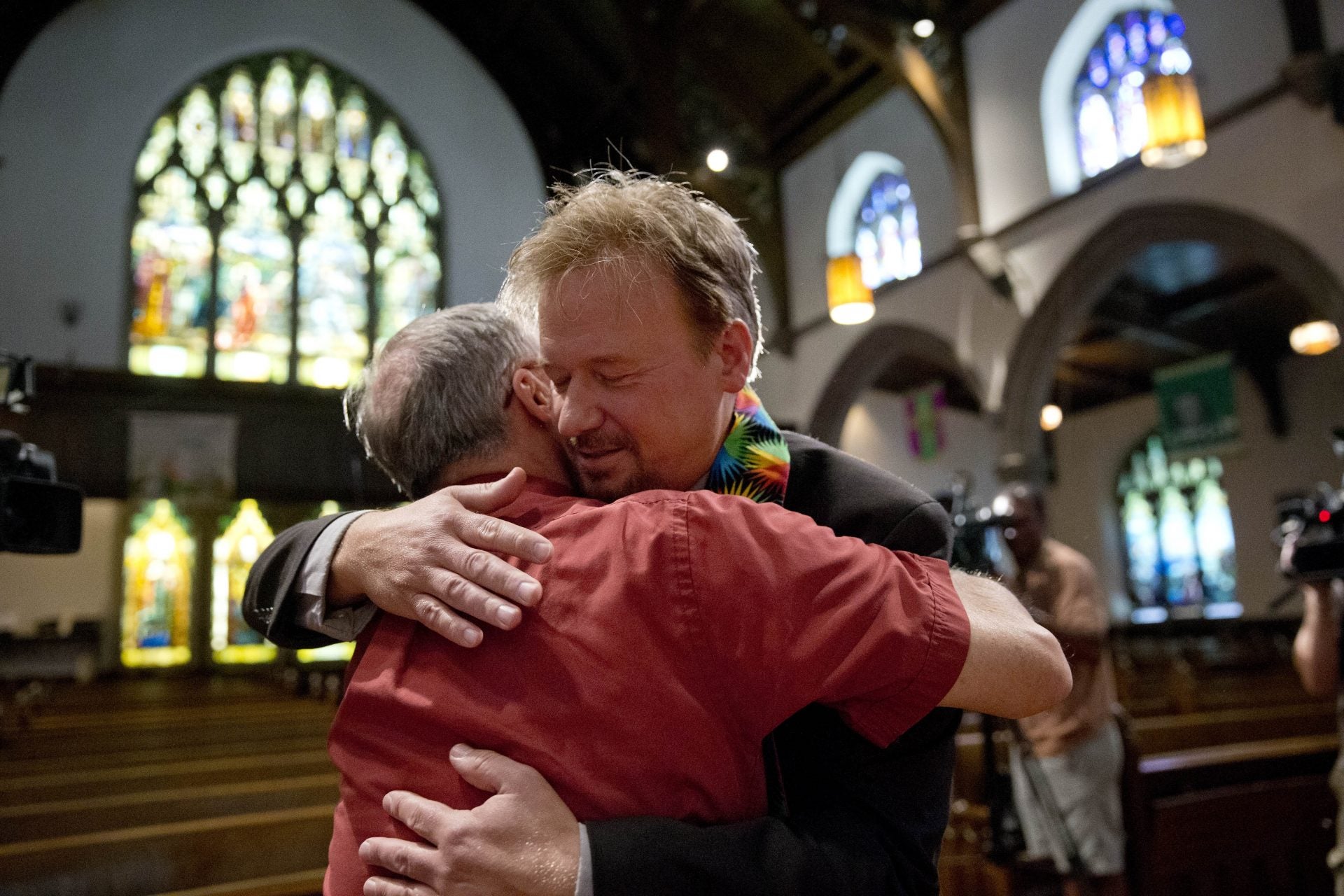
The Rev. Frank Schaefer, at the time pastor at Zion United Methodist Church of Iona, was stripped of his ordination credentials stemming from charges that he performed a gay wedding for his son. The following year, the Judicial Council, the church’s top court, upheld a decision by a regional appeals committee to reinstate Schaefer’s ministerial credentials.
“I suspect that what is immediately going on in Harrisburg is one of many local manifestations of turmoil happening in the United Methodist Church in many places,” Lawrence said. “As in many aspects of human life it’s almost impossible to address one issue at a time. You have many destabilizing forces affecting Methodist life generally at the same.”
Then and now the deep and bitter differences threaten to ignite an exodus from churches and the denomination.
That may already have started in Harrisburg.
The congregation at Trinity United Methodist Church has reportedly voted to leave the denomination and join the nearby Church of God, also in Penbrook.
PennLive made repeated attempts to speak to the Rev. Barbara Berg of Trinity United but was not able to reach her.
The Rev. Mark Halliday of the Penbrook Church of God said parishioners from Trinity United had already begun to attend Sunday service at his church.
“We are excited about the opportunity to be able to worship and gather in fellowship with our Christian brothers and sisters,” said Halliday, noting that his church’s theology and traditional service were similar to that of the United Methodist.
“I feel bad for the pastors who are being told they no longer have a church,” he said. “It’s just a rough thing. I think you could talk to any pastor from any church and they would be sympathetic.”
Halliday said his church already opens it doors so that other churches can use the space and that his community is ready to welcome all newcomers.
“This is almost like losing a loved one,” he said. “There is a lot of mourning when a church closes. We need to be there to support and encourage.”
This week, the dismissal of Rev. Mack Granderson of the Derry Street United Methodist Church further fueled the debate over the plan to close and merge the city’s churches.
Granderson, who presided over one of the largest United Methodist Churches in Harrisburg, said he was stripped of his clergy credentials after he presented to congregants the option to leave the denomination and establish their own church.
The Susquehanna United Methodist Conference characterized Granderson’s dismissal as a personnel matter.
Shawn M. Gilgore, a spokesman for the conference, said Granderson violated pastoral duties when he showed “an intent and plan to establish an independent congregation.”
Claude Phipps, head of the administrative council at Derry Street United Methodist Church, fears for the future of his church.
He is fighting along with other congregants to keep Derry Street open and stave off a merger with the newly formed congregation known as Journey United Methodist Church. The dismissal of Granderson further discombobulated an already discontented congregation, he said.
Derry Street has submitted its strategic plan to church leaders. Phipps said that if the plan is rejected and the church forced to merge, he will likely leave the church and that “a sizable amount of the congregation will walk with him.”
Granderson, who delivered his last sermon on Sunday, bemoans the current turmoil in his church and what it is doing to the flock.
“People en masse are running away from God,” he said. “Nationally Sunday attendance is between 20 percent to 37 percent of the country. We recognize that therefore we should be doing all that we can to turn our culture around so that we are able to worship God fully and bring more disciples to Jesus Christ.”
The way things are playing out, the future for the United Methodist Church will hinge on one or two options for congregants: defy or depart.
“Those basically are the two strategic options many United Methodists consider themselves facing these days,” Lawrence said. “Do I defy church law and continue to function as I believe God calls the church to do or do I depart and try to find a spiritual home in another institutional setting?
Whatever happens going forward, Lawrence said he is confident Methodism will prevail.
“But I am far less confident that the denomination known as the United Methodist Church will exist in the future in its present form.”
PennLive and The Patriot-News are partners with PA Post.
WHYY is your source for fact-based, in-depth journalism and information. As a nonprofit organization, we rely on financial support from readers like you. Please give today.


